Church
About Andrew Cusack
 Writer, web designer, etc.; born in New York; educated in Argentina, Scotland, and South Africa; now based in London.
Writer, web designer, etc.; born in New York; educated in Argentina, Scotland, and South Africa; now based in London. read more
News
Blogs
Reviews & Periodicals
Arts & Design
World
France
Mitteleuropa
Knickerbockers
Argentina
The Levant
Africa
Cape of Good Hope
Netherlands
Scandinavia
Québec
India
Muscovy
Germany
Academica
The Start of Something Big in Argentina
The first-ever Nuestra Señora de Cristiandad Pilgrimage to Luján
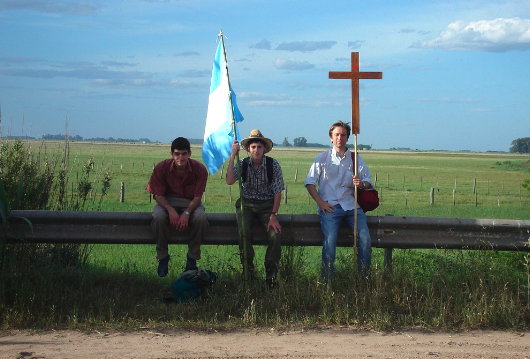
SMALL SEEDS, IF well-planted and tended to, flower into much larger growths. On a Friday morning last month, just four pilgrims set out from the town of Rawson in the Buenos Aires province of Argentina, but by the time they reached their destination — a Latin Mass in the Marian basilica of Luján — their numbers swelled to nearly a hundred. The pilgrimage of November 5th, 6th, and 7th, under the patronage of ‘Our Lady of Christendom’ (Nuestra Señora de Cristiandad) was inspired by the traditional Paris-Chartres pilgrimage every Pentecost weekend. The organisers hope that, like the Chartres pilgrimage, this trek to Luján will become an annual recurring event.
“Renewing Christendom in Argentina” was the theme of this year’s pilgrimage, which “seeks to promote the rich tradition of the Roman Catholic Church for our times” the organisers announced in a press release after its completion.
“This new 100-kilometre pilgrimage was an act of reparation and praise to God, imploring the salvation of souls through the renewal of Christian culture and the rediscovering of the bi-millennial tradition of the Church.” (more…)
Media Lies About the Pope
In an interview, Benedict XVI reaffirmed the immorality of using condoms, but the press have spread a lie claiming he did the exact opposite
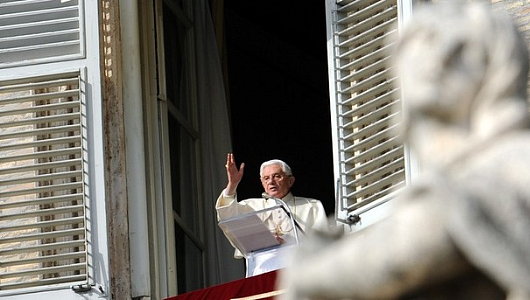
Wow. Just wow. No matter how low my opinion of journalists and the media already is, they’ve proved that they still have the ability to astound by the depths of their depraved mendacity. The latest big giant whopper the media are dealing out is that Pope Benedict XVI has ‘changed church teaching’ by ‘lifting the absolute ban on condom use’. You should know by now that when the media report almost anything relating to the Pope or the Church, the reality is either A) the media have completely made it up, or B) the exact opposite of what the media say is true.
This one we can file under “B”: the Pope has reaffirmed the immorality of using condoms and the media have decided to claim the opposite. A new book, Light of the World is being published this week containing several interviews with the Pope by the German journalist and editor Peter Seewald.
When asked about the Church’s teaching on condoms, the Pope reaffirmed that the Church “of course does not regard it as a real or moral solution”. However, the Holy Father speculated about the intent of some condom users. (more…)
The Daily Telegraph Prints Lies
Stop blaming ‘the media’: it’s time to call out the bad apples by name

Strictly speaking, a lie is a false statement with the intent to deceive. Without the ability to read minds, it’s difficult to discern when someone who has made a false statement is intentionally lying or has merely been incorrectly informed. The intent of a journalist should be to inform — but today the deed of journalists is more often to deceive (whether intentional or otherwise). To cite but one example, Jonathan Wynne-Jones (pictured above) holds the job of Religious Affairs Correspondent for the Daily Telegraph, the widely read British broadsheet which claims to be a ‘quality’ newspaper.
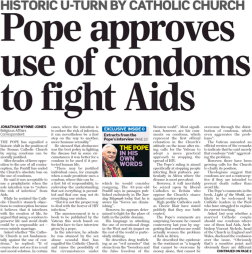 Read Mr Wynne-Jones’s article alleging that the Pope “has ended the Church’s absolute ban on the use of condoms”. Wynne-Jones spreads this lie from the very first sentence and continues along the same lines throughout the piece. His selective quotation is interesting, as is the fact that the fuller quotations he cites in no way back up the false contentions Wynne-Jones makes in the article.
Read Mr Wynne-Jones’s article alleging that the Pope “has ended the Church’s absolute ban on the use of condoms”. Wynne-Jones spreads this lie from the very first sentence and continues along the same lines throughout the piece. His selective quotation is interesting, as is the fact that the fuller quotations he cites in no way back up the false contentions Wynne-Jones makes in the article.
Let’s have a look at the article. (more…)
The Situation at St Andrews
Or: A Lesson in Corroborating Your Sources
AS IF, WITH THE recent announcement that a certain St Andrean couple are getting engaged, there wasn’t enough for us to expend our idle chatter about, the University of St Andrews is thrust into the fore on an entirely separate matter. Damian Thompson, the provocative and informative Catholic Herald editor and indispensable Daily Telegraph blogger wrote a blog entry — Catholic students at St Andrews ‘can’t have the Latin Mass’ — relaying the claims of a student that he and a stable group of students have asked to have a monthly Mass in the Extraordinary Form, found a priest willing to say it, and have been denied. Fr. Z, the world’s most famous clerical blogger, soon picked up the story as well and made a few comments of his own.
The reality of the situation, it appears, is far removed from the one student’s claims. (more…)
Saints in Heaven, Pray for Us!

There are events occurring very soon which have massive life-changing potential for your humble & obedient scribe, and which could go quite horribly wrong or astoundingly well.
I absolutely implore you to pray to all the saints in Heaven, and especially to whichever Guardian Angels may be relevant, to combine, conspire, pray, and intercede for my special intention.
Thank you in advance for all your prayers, and I will keep you all in my prayers as well.
Antipopes We Have Known
The University of St Andrews is commencing the celebrations of its 600th anniversary, as the institution was founded in stages between 1410, when teaching started, and 1413, when a bull was issued recognising it as a university by Pedro de Luna, an antipope who styled himself Benedict XIII. Yesterday I attended a fascinating lecture by Dr. John Rao — From the Triple Papacy to the Council of Constance — as part of the 2010–2011 lecture series organised by the Roman Forum.
Boy was Benedict a baddie! Even the council he called passed resolutions condemning him and the cardinals he appointed turned against him. He ended his days maintaining his schismatic claim, holed in island fortress of Peñiscola. The day before he died, he appointed four cardinals, who elected de Luna’s friend Gil Sanchez Muñoz y Carbón as Clement VIII. Or rather, three of the cardinals did while the fourth — Jean Carrier, the archdeacon of Rodez — wasn’t present, so he went and single-handedly elected his sacristan Bernard Garnier as pope, who took the name Benedict XIV.
Garnier was permanently in hiding, and his location was only ever known to Carrier. B-14 did manage to choose four cardinals of his own, and on the antipope’s death they elected Carrier pope, who was inconveniently captured and imprisoned by his rival antipope, Clement VIII. Oddly, having just succeeded the supposed Benedict XIV, Carrier chose to use the name and style Benedict XIV also. A novel by Jean Raspail (L’Anneau du pêcheur) depicts a line of anti-papal successors to the two Benedict XIVs.
As a lecturer, Dr. Rao is both informative and entertaining, and I’d encourage anyone interested to attend the remaining lectures in this year’s series. There’s always wine on offers and little things to nibble on, with a box for generous donations to be made towards the cost of the program. The next lecture is Martin V and the Troubled Return to Rome — this week is the 593rd anniversary of that pope’s election, as it happens.
Also, Dr. David Allen White, retired Professor of World Literature at the United States Naval Academy, returns to New York in December for the Syllabus of Errors Weekend, on the subject of Charles Dickens and the Evils of Modernity. I went to last year’s Syllabus of Errors weekend, and Professor White is entrancingly engaging, a veritable font of knowledge.
Charles of Austria
TODAY IS THE first feast of Blessed Charles since the announcement last December that the cause for the canonisation of his wife, Zita of Bourbon-Parma, has been opened as well. In an age when most people in government and public leadership seem barely even decent, let alone saints, it is all the more important to seek the prayers and intercession of Charles and Zita — husband and wife, mother and father, Emperor and Empress — for the preservation of peace, the prevention of war, and the renovation of our families as well as our societies at large. (more…)
Alan Dershowitz Defends Pope Benedict
Benedict XVI has “Done More to Protect Young Children” Than Any Other Pope According to Harvard Law Professor
The Harvard Law School professor & criminal appellant attorney Alan Dershowitz has defended Pope Benedict XVI while speaking to a television news programme in Australia. Dershowitz travelled to the continent to take part in a debate with the lawyer & activist Geoffrey Robinson QC who has waged a campaign to have the Pope tried under international law as culpable for the abuse of children by Catholic priests.
Robinson (a dual citizen of Australia and Great Britain) is well-known in legal and intellectual circles, where he has defended the use of kangaroo courts to try and convict alleged perpetrators of great crimes: his 2005 book The Tyrannicide Brief defended John Cooke, the solicitor general who prosecuted Charles I of England for treason. The Australian academic has also defended the practice of more powerful nations waging war against smaller ones to prevent the latter from committing crimes against humanity, and has argued in favour of the bombings of Hiroshima and Nagasaki.
Dershowitz told the Australina Broadcasting Corporarion’s Tony Jones that Robertson’s attempt to have Pope Benedict tried before under international law was “wrong”.
International law deals with war crimes, it deals with systematic efforts by governments to do what happened, for example, in the former Yugoslavia and Rwanda, in Darfur and Cambodia. This is not in any way related to that. … This is not a crime against humanity, this is a series of crimes by individual priests and others throughout the world and failures by institutions to come to grips with it quickly enough.
Prof. Dershowitz said he thought Benedict has “probably done more to protect young children since becoming Pope than any previous Pope”. (more…)
Journowatch: Headline vs. Story
In an article about the soon-to-be-canonised Australian nun, Mary McKillop, the Daily Telegraph exhibits a peculiar example of the lows of newspaper journalism today.
The headline boldly states “Australian nun ‘to be made patron saint of abuse victims'” only for the sub-headline — “An Australian nun who will be canonised by the Pope next month should be made the patron saint of clerical sex abuse victims, Catholics have suggested.” — to directly contradict this.
Is Mary McKillop “to be” the patron saint of the abused or has it merely been “suggested”? The headline-writer put the ‘to be’ in quotation marks, but the article doesn’t supply a single quotation or piece of evidence showing this decision has been reached, only a quotation suggesting it would be a wise course of action.
I’ve read numerous examples of newspaper articles offering contradictory facts unreconciled, but to do so before the article has even started seems particularly bizarre.
Interesting Things Elsewhere
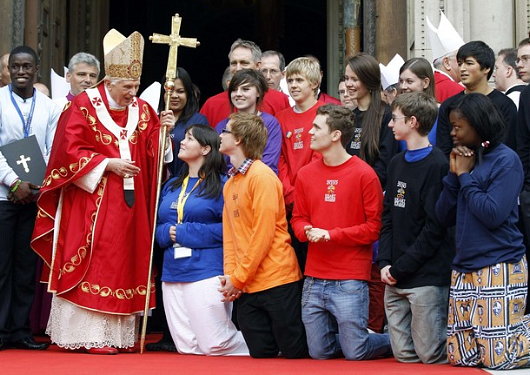
Benedict and Britain
The papal visit began in Scotland, and the smaller setting (Scotland has just five million people, fewer than London alone) proved a wiser starting point of the pontiff’s trip to Great Britain. “Would the first day have been the success it was if it had taken place in England?” asked William Oddie. “Would the papal chemistry have worked so soon in London, that vast and engulfing megalopolis, if the reception by Her Majesty had taken place in the impersonal splendours of Buckingham palace rather than in that ancient architectural wonder Holyrood house (whose very stones are a testimony to its Catholic origins) and if the Popemobile ride through the streets afterwards had been down the Mall?”
Damian Thompson has argued that the papal visit has proved a triumph for Benedict and a humiliation for the secular-humanist crowd. The Daily Telegraph blogs editor and Catholic Herald editor-in-chief says that the Pope’s natural shyness has worked to his advantage, while the former Spectator editor Dominic Lawson argued in the Independent that Benedict’s unpolitical nature gives him a popular appeal.
The volume and biliousness of the media’s campaign against Benedict XVI has actually backfired and turned the lukewarm into pope-welcomers (like Kate Hoey MP, reports Christina Odone). Another blogger reported the influence a television programme produced by the gay activist and sometime paedophilia sympathiser Peter Tatchell that was broadcast just before the Pope’s arrival:
‘Are you going tomorrow?’ I asked. ‘Yes, I am,’ she replied. ‘I wasn’t going to at first, because it’s a long day, but when I saw that rubbish last night on the telly, I changed my mind. I’m don’t care if I die there; I’m going.’
Meanwhile Mark Dowd, another homosexual, was determined to be even-handed in his documentary “Benedict: Trials of a Pope”, and his broadcast was well-received. The filmmaker wrote in the Catholic Herald “when you have to make a one-hour programme on one of the most clever and gifted people on the planet you have to look behind the headlines and the angry rants on the blogosphere. In short, you have to do justice to the man as best as you can.”
Hilary White had a chat with barrister and Catholic Union chairman Jamie Bogle, who argued that the visit has taken the wind out of the sails of Benedict’s enemies.
“Jamie also pointed out that the protesters were having a bit of fun with the numbers,” Hilary writes. “A friend in Vancouver said that 25,000 turned out for the demonstration. The National Secular Society said it was ‘between 10 and 12,000’. But Jamie told me he had spoken with some of the cops present, and they said it was no more than 2,000.”
It was like a scene from 1984
Atheist Brendan O’Neill reported being disturbed by the anti-papal demonstrators, reporting that there is “a sharp authoritarian edge” to the radical pope-haters. “Things turned ugly outside Downing Street when Terry Sanderson of the National Secular Society branded the pope an ‘enemy of the state’, giving rise to the cacophonous chant: ‘GO HOME POPE, GO HOME POPE.’ It was like a scene from 1984. I have been on many a radical demo that has challenged the branding of some group or individual as ‘enemies of the state’; but this is the first radical demo I’ve been on where the protesters themselves demanded the silencing and even expulsion from Britain of someone they decreed to be an ‘enemy of the state’. Even one-time ‘enemies of the state’ – the so-called queers and the old left – were using that criminalising phrase, that piece of political demonology, to chastise the pope. It was the world turned utterly upside down.”read more
Also: The campaigners against the pope’s visit have more in common with the fanatical Inquisitors of old than with Enlightened liberal humanists, says Frank Furedi.
The conservative case for rail
File this one under “things we always knew and are glad someone agrees”: the dissident conservative fortnightly The American Conservative presents a symposium of articles about getting the USA back on the rails. William Lind attempts to destroy the myth of public-transport-hating conservatives while attacking the rampant subsidisation of federal highways. Former Milwaukee mayor John Norquist says the Right shouldn’t surrender the cities to the Left. Glen Bottoms does the numbers on the return to rail and tries to figure out how much it will cost. Finally, John Robert Smith argues that there’s still some life in America’s Main Streets. Christopher Leinberger discusses how private development can fund public infrastructure. read more
The Thomist constitution
St. Thomas Aquinas, the “Dumb Ox”, stated that “all should take some share in the government: for this form of constitution ensures peace among the people, commends itself to all, and is most enduring”. Aelianus muses on a Thomistic view of government, explores the pros and cons of monarchy, aristocracy, democracy, and ponders the political position of the family in society. read more
Swedish under threat in Finland
Swedish was historically the language of Finland’s nobility and intelligentsia, as well as of the country’s ethnic Swedish minority — Finland’s first president and greatest hero, Field Marshal Mannerheim, could barely even speak Finnish. But while the Scandinavian land is still officially bilingual in education and government, the 5.5% of the population who are Swedish-Finns is increasingly viewed as “the world’s most pampered minority”. read more
The Südtirol success story
Amid the warnings of doom and gloom ahead for the Italian economy, one province has almost full employment and a healthy economy, not to mention a governor who has ruled for over twenty years. “We are living in the promised land,” — Südtirol. read more
Follow the Pope’s Visit
What are the best ways of following the Pope’s visit to Great Britain? The official website is offering a live webcast of all events, with highlights from the day interspersed between events. The Daily Telegraph is live-blogging the papal events each day, with frequent updates; today can be found here. The Catholic Herald is also live-blogging the Papal Visit, and updates on today’s events can be found here.
Check catholicherald.co.uk and telegraph.co.uk for more throughout the visit.
Chartres MMX
The Pentecost Paris-Chartres Pilgrimage 2010
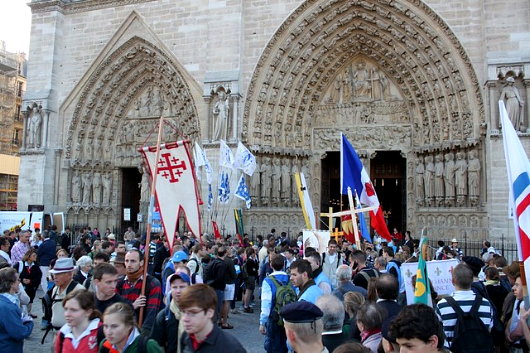
PENTECOST commemorates the descent of the Holy Spirit, often considered the birthday of the Church. Each year, this great feast of the Church is marked by the pilgrimage from the Cathedral of Notre-Dame de Paris on the Île de la Cité (above) to Notre-Dame de Chartres in the Orléanais by pilgrims young and old devoted to the traditional form of the Latin rite. The pilgrimage, often a feast of flags and banners, takes three days beginning on the Saturday of Pentecost weekend, continuing through the great feast itself, and arriving in Chartres on Pentecost Monday (which is still a public holiday in France). This year, Cardinal Vingt-Trois, the Archbishop of Paris, graciously led Benediction on the second day of the pilgrimage, and met with and blessed individual pilgrims. (more…)
Debating Hiroshima
Christian morality versus modern relativism
THREE YEARS AGO over on the New Criterion’s blog, Armavirumque, my friend and then-colleague & boss Roger Kimball and I had an interesting exchange on the morality of the bombing of Hiroshima. The debate began when Roger wrote a blog entry citing an opinion piece from Oliver Kamm of the Guardian supporting President Truman’s decision to drop the Bomb. I then responded with a post of my own pointing out that the conservative reaction at the time was one of horror at the moral depravity to which we had descended, and that the it-would-have-been-worse-if-we-didn’t school of thought essentially can be reduced to an ends-justifies-the-means argument. Roger then responded with a post arguing that, well, sometimes the ends do justify the means.
Regardless of one’s thoughts on the Hiroshima bombing, arguing that the ends justifies the means is one of the cornerstones of relativism. Christians believe that we are not allowed to do evil, even if that evil may serve a good cause. It is not simply a matter of choosing something bad over something worse. Evacuating the British Army from Dunkirk, for example, was bad, but leaving it there was worse. Yet, both were morally licit options for Churchill to make, though the prudential evidence supported the former option rather than the latter.
Innocent people inevitably die in most wars, but that cannot excuse the deliberate and intentional targeting of an entire city for destruction by a military force. That so many American Christians still excuse the bombing of Hiroshima and Nagasaki is frightening evidence that America has convinced Christians to be Americanised rather than Christianity convincing America to be Christianised. (more…)
Interesting Things Elsewhere
This determined Celt is gunning for Thabo
Kevin Bloom | The Daily Maverick
Ireland’s 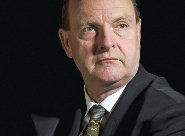 Paul O’Sullivan took over as head of security at South Africa’s airport authority in 2001, and discovered something was wrong from the start: why didn’t the policeman on duty want to take a statement about the attempted theft of his baggage? Since then, his life has been a series of bizarre events leading him ever deeper into the most complex criminal network of the post-apartheid era, including the recent the trial and conviction of former national police chief Jackie Selebi. But O’Sullivan’s determined quest to expose crookedness isn’t over yet, and he now has former president Thabo Mbeki in his sights. read more
Paul O’Sullivan took over as head of security at South Africa’s airport authority in 2001, and discovered something was wrong from the start: why didn’t the policeman on duty want to take a statement about the attempted theft of his baggage? Since then, his life has been a series of bizarre events leading him ever deeper into the most complex criminal network of the post-apartheid era, including the recent the trial and conviction of former national police chief Jackie Selebi. But O’Sullivan’s determined quest to expose crookedness isn’t over yet, and he now has former president Thabo Mbeki in his sights. read more
The apparatus of state will simply ignore the government
‘Inspector Gadget’ | Police Inspector Blog
Police across England were told by the responsible minister of the democratically elected government that they must not chase performance targets any longer. “I can also announce today that I am also scrapping the confidence target,” said the Home Secretary, Theresa May, “and the policing pledge with immediate effect”. But the ‘senior management team’ of the West Yorkshire Police have stated they will go on no matter what the government says. read more
Has Christian Democracy reached a dead end?
Jan-Werner Mueller | Guardian.co.uk
The commentator completes a brief survey of the struggles of Christian Democracy in Germany and Europe today. The French leader Georges Bidault claimed that Christian Democracy meant “to govern in the centre, and pursue, by the methods of the right, the policies of the left”. But Christian Democracy’s brief French moment in the 1950s didn’t survive the return of de Gaulle, and Christian Democratic parties on the continent today face an existential crisis. read more
Also: Monsignor Ignacio Barreiro’s talk at the Roman Forum’s 2010 Summer Symposium, entitled The Problem of Christian Democracy will be made available online in audio form sometime in the coming months.
Deep in Shanxi, the most Catholic village in China
Anthony E. Clark | Ignatius Insight
Church after church dot the landscape and high steeples rise above small villages as they do in southern France. Passing through a narrow side road one arrives and is welcomed by three great statues at the village entrance: St. Peter holding his keys is flanked by Saints Simon and Paul. Thirty minutes before Mass the village loudspeakers, once airing the revolutionary voice of Mao and Party slogans, now broadcasts the rosary. Welcome to Liuhecun, the most Catholic village in China. read more
Look for me in the Cotswolds.
Dino Marcantonio
The apologists for modernist architecture have tried for a century to gain public acceptance of and appreciation for their horrors. While the elites have almost overwhelmingly been converted, the general populace around the world still sees that the Emperor has no clothes, and almost always prefers architecture that reflects the tried and true, the local and the natural. Alain de Botton, the Swiss essayist, ‘pop philosopher’, and former ‘writer-in-residence’ at Heathrow Airport, is the latest to give it a go, this time in the pages of the modernist Architectural Record. Dino Marcantonio provides a most useful fisking. read more
Canada is a French country
Andrew Coyne | Maclean’s
At the recent Canada Day celebrations on Parliament Hill, Canadian PM Stephen Harper spoke of “the steadfast determination and continental ambition of our French pioneers, who were the first to call themselves ‘Canadians.’” At other times he has spoken of Canada as having been “born in French,” of French as “Canada’s first language,” and, most famously, of Quebec City as “Canada’s first city,” its founding in 1608 as marking “the founding of the Canadian state.” While the sentiment may seen anodyne, moreover, the implications are radical. read more
A School Chapel on Long Island
St. Anthony’s High School, South Huntington, L.I.
“I have a general disgust for Catholic architecture since the 1950s,” says Brother Gary Cregan, the Franciscan friar who is principal of St. Anthony’s High School in South Huntington. The friar was quoted by the once-great New York Times in a 2008 article on the new chapel built by the Catholic school on Long Island, recently featured on the NLM blog. The Franciscans, according to the Times, “believe that the new chapel, with its soaring 30-foot ceilings, will teach teenagers that they are ‘worshiping God, not each other.'” Many of the chapel’s furnishings were bargain finds on eBay including the confessionals, the pews, a 110-year-old stained-glass window, and a century-old statue of St. Anthony. A new bell for the chapel’s tower would’ve cost $20,000, but Brother Gary (or “Mr. Cregan” as the newspaper referred to him) found an old one for $4,000. (more…)
Rod Dreher is Profoundly Mistaken
Rod Dreher, a normally interesting commentator and incisive thinker, is profoundly mistaken in his response to the Pope’s handling of the Schönborn-Sodano spat, and betrays a fundamental misunderstanding of what’s gone on.
In April, Cardinal Schönborn, the Archbishop of Vienna, publicly and by name criticised Cardinal Sodano, the former Vatican Secretary of State, accusing him of having frustrated attempts to investigate abuse by clerics and further criticising his dismissal of some claims of abuse as “petty gossip”. These criticisms were largely seen as justified in their substance but were note-worthy as it is not customary for cardinals to attack one another publicly and by name.
The Pope then oversaw a meeting between Cardinal Schönborn and Cardinal Sodano (who, since 2006, is no longer Secretary of State) as an act of reconciliation. Alongside this meeting, a statement was released which included a gentle reminder that authority over the College of Cardinals is reserved to the Holy Father, and that likewise the supervision and criticism of cardinals is reserved to him, in consultation with others.
The reservation of this right to the Pope is both wise and justified. The basic idea is that cardinals are not to waste their time criticising one another, lest they, being human, be tempted into continual criticism which would interfere with and impede the work of their fellow cardinals.
The gentle reminder in this statement has, unfortunately, been blown completely out of proportion by the media. Rod Dreher has only augmented this with his commentary, but in doing so betrays a fundamental error that he made: his comments cite an Associated Press report of the supposed “unprecedented public rebuke”.
It is no surprise that Dreher found the AP report “both heartbreaking and infuriating”, as that is generally what AP reports related to the Church are designed to do. The Associated Press has fairly consistently and over a long period of time demonstrated their lack of reliability or journalistic credibility owing to their complete lack of understanding of how the Church operates and their undercurrent of antagonism to Christianity in general.
It is more “heartbreaking and infuriating” that a man as smart as Rod Dreher has had such a lapse of judgement as to allow the Associated Press to be the informer of his thoughts and guide of his heart. Dreher’s claim that Pope Benedict has “humiliated” Schönborn is complete nonsense, which is the result of Dreher’s unfortunate trust in the sham journalism of wire services. Dreher is also simplistic in his treatment of Cardinal Schönborn, who has been known to have gone a bit loopy of late, even to the extent of expressing reserved support for the ridiculous “apparitions” at Medjugorje, and even suggesting the Pope might visit the town some day.
The Archbishop of Vienna’s stringent stand against clerical abuse is nonetheless a most welcome counterpoint to the lackadaisical approach of the John Paul II-era curia. Small wonder the Pope spent the beginning of his pontificate making very wise replacements of questionable JP2 appointments, and continues to have a good eye for decent churchmen and for appropriate roles for them to exercise in the Vatican.
“This action by the pope is not a sign of strength,” writes Dreher, “but its opposite.” Does Dreher really think that allowing a cardinalatial free-for-all would be a sign of strength, while taking steps to remind cardinals of their obligations is a sign of weakness? Rather, Benedict has, as has been the mark of his pontificate, taken the route of gentleness and reconciliation while simultaneously stressing the need for order and unity.
Alice von Hildebrand on Life
This superb lecture to a high-school audience by Alice von Hildebrand, the retired Professor of Philosophy at Hunter College of the City University of New York, was sent to me by an acquaintance at the University of Caen in Normandy (a town I had the pleasure of visiting some years ago).
The speaker is the widow of the famous Prof. Dietrich von Hildebrand, and speaks with a fascinating insight tempered by good humour. I thought I’d just listen to a bit of it but became entranced and couldn’t tear myself away from it.
Mrs. von Hildebrand covers an astonishing variety of subjects but the animating focus of the lecture is the relationship between body and soul, and how that is reflected in the relationship between man and woman.
“It’s a privilege for an elderly person to share her experience with young people,” Mrs. von Hildebrand says. “It’s a very special joy to share with you the gifts I have received.” However privileged the speaker feels, I’ve no doubt it is rather the listeners who are privileged to hear so a woman of such great wisdom speak to them at so young an age.
I know one of the most memorable interactions I ever had was with the Polish freedom fighter and Auschwitz survivor Jozef Garlinski when I was just sixteen years old — the late Mr. Garlinski’s most important lesson continues to exert a profound influence over me, and was one that I have always remembered at the more trying times in life since then.
These students are blessed to receive such an important life lesson.
Our Cardinal Strikes Again
Cardinal O’Brien, Scottish Primate, Preaches at Newly Ordained Priest’s First Mass in the Extraordinary Form at St. Mary’s Cathedral Edinburgh
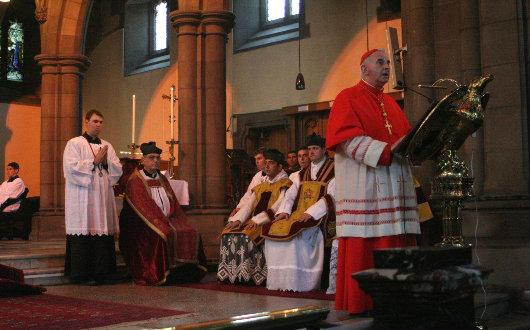
Keith Patrick O’Brien, the Primate of Scotland and Cardinal Archbishop of St Andrews & Edinburgh, this weekend preached at the first mass offered by the recently ordained Fr. Simon Harkins of the Priestly Fraternity of St. Peter. The mass was offered in the Cardinal’s own Cathedral of St. Mary in Edinburgh, Fr. Harkins’s own home town. The Very Rev. Fr Josef Bisig FSSP and the Very Rev. Fr. Franz-Karl Banauch FSSP assisted, and monks from the Transalpine Redemptorists of Papa Stronsay (who provided these photos) were also present, in addition to a number of diocesan priests.
I’ve spent the past eight years of my life divided between three (arch-) dioceses and I have to admit that Cardinal O’Brien is still the one I feel the greatest affection for. He’s an affable, uncomplicated fellow, and can be relied upon to defend what’s right in the media — unquestionably one of the best prelates in Britain today.
“I find him a much more approachable figure than other Scots prelates,” writes Damian Thompson, “less inclined to stand on his dignity despite (or perhaps because of) his red hat. I met him once at a party to relaunch the Scottish Catholic Observer, to whom he’s been a good friend; he didn’t sweep in surrounded by flunkeys, but hung around chatting in ordinary priest’s dress, reminding me a bit of Basil Hume in that respect.”
As it happens, I’m head of Cardinal O’Brien’s fan club on Facebook, which I encourage any Facebook users out there to join.
God bless our cardinal, and many congratulations to Fr. Hawkins! (more…)
Clarity on Torture
Those who see abortion as an evil are often frustrated by those who attempt to justify abortion by vague arguments about “choice” or even more practical arguments about exceptions for rape or incest, or the health of the mother. But many of these same people lose their moral clarity when the subject is torture. Suddenly they are the ones bringing up exceptions and parsing definitions.
There is so much confusion over this issue that in a recent TV interview, a prominent Catholic journalist let a former Bush Administration speechwriter, also a Catholic, grossly misrepresent Catholic teaching in a shameful apologia for torture.
Let us re-establish clarity. Torture, whether physical or psychological, is a barbaric, savage act, not justifiable under any circumstances, and unworthy of a civilized society.
But don’t take our word for it. For those readers who are religious, the Evangelical Lutheran Church in America began calling for America to cease torturing prisoners more than a year ago. American Episcopal bishops agree, as do other Protestant denominations. For our Catholic readers, Pope Benedict XVI wrote, “I reiterate that the prohibition against torture cannot be contravened under any circumstances.” The Catholic Church draws no distinction between physical and psychological torture.
For those readers who aren’t religious, we turn to U.S. law and international law, where torture is, without exception, condemned. Not one state or municipal law enforcement agency permits it. The Army Field Manual, which regulates interrogations by the U.S. military, prohibits torture. So does the Geneva Convention—a treaty to which both the Holy See and the United States are signatories. None of these institutions or documents draws any distinction between physical and psychological torture either. For all, torture is torture.
When Catholics and Protestants agree, and when religious and secular institutions agree, that torture is an offense against human dignity and that those guilty of it should be thrown in jail, may we not agree that perhaps it is immoral? Do we really need to get into the nuts and bolts of what constitutes torture?
Yes, we do. Most will agree that taking a power drill to a man’s shoulder or pulling out his fingernails with pliers for punishment or to extract information is torture. But when the subject is waterboarding, clarity vanishes again. Some consider waterboarding to be mere psychological torture—which, as we’ve already established, is morally indistinguishable from physical torture.
But waterboarding is not a harmless dunk in the tub, as former Vice President Dick Cheney once likened it, and it is not psychological torture. In waterboarding, a subject is strapped to a gurney. His feet are elevated slightly above his head. A cloth is draped over his face. And water is poured on his face so that it enters his nose and mouth and flows into his lungs. CIA interrogators are instructed to pour the water immediately after a detainee exhales, to ensure he inhales water, not air. They use their hands to “dam the flow” of excess water from a detainee’s mouth. And detainees who are scheduled for waterboarding are put on a liquid diet, to minimize the risk of death should they inhale their own vomit.
This procedure became official American policy in our so-called War on Terror, but it was not always so. Waterboarding has been condemned by the United States government since at least 1898, when American soldiers were court marshaled for waterboarding prisoners during our occupation of the Philippines following the Spanish-American War. In World War II, we hanged Japanese war criminals for waterboarding American and Allied troops. In the 1980s in Texas, a sheriff and three of his deputies were convicted by the Justice Department for waterboarding prisoners to extract confessions.
And yet, there are those exceptions: American security is at stake. If waterboarding saves even one life, isn’t it worth it?
If torturing a terrorist suspect saved a city from destruction, or if it saved even one life, it would still be a barbaric, savage act, unworthy of a civilized society. If expediency were enough to justify an immoral act, then abortion would be justifiable.
G.K. Chesterton wrote in 1916 that people who purport to defend civilization against barbarians undermine their cause when they resort to barbaric tactics. “The more we insist that the terms must be our terms, the more do we weaken ourselves if the methods are their methods.”
During World War I, when some in England demanded that German soldiers captured on English soil be denied humane treatment, Chesterton countered, “Such small revenges are unworthy of the dignity of indignation. They are also futile and inconsequent.”
Our whole hope of getting a monster killed and not scotched depends upon our keeping fresh the original human horror at its monstrosity. It may be illogical, but it will certainly be natural, if that horror is somewhat dulled if, by the end of the war, everybody seems to be fighting with pretty much the same weapons.
When you torture, you turn the victim into a hero, for there is more honor in defying a torturer than in being a torturer.
“A kind of courage can exist in a merciless and unmagnaminous soldier, as it can exist in a merciless and unmagnaminous wild pig,” Chesterton wrote. “But it does not happen to be the kind of courage that our brethren have died to keep alive.”
Search
Instagram: @andcusack
Click here for my Instagram photos.Most Recent Posts
- Gellner’s Prague December 19, 2024
- Monsieur Bayrou December 18, 2024
- Dempsey Heiner, Art Critic December 17, 2024
- Vote AR December 16, 2024
- Articles of Note: 12 December 2024 December 12, 2024
Most Recent Comments
Book Wishlist
Monthly Archives
Categories


